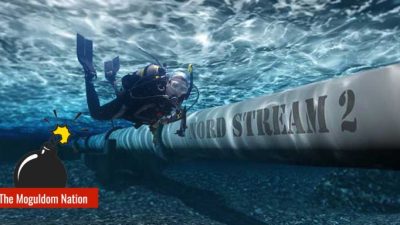Macroeconomic Suicide? EU Endorsed Sabotage of Nord Stream, So That It Could Import More LNG Shipments From Russia at a Much Higher Price?

All Global Research articles can be read in 51 languages by activating the Translate Website button below the author’s name (only available in desktop version).
To receive Global Research’s Daily Newsletter (selected articles), click here.
Click the share button above to email/forward this article to your friends and colleagues. Follow us on Instagram and Twitter and subscribe to our Telegram Channel. Feel free to repost and share widely Global Research articles.
Global Research Referral Drive: Our Readers Are Our Lifeline
***
By allowing (or even being an accomplice to) NATO’s terrorist attacks on the Nord Stream pipelines, the European Union effectively committed macroeconomic suicide.
As per usual, the mainstream propaganda machine immediately blamed Russia for supposedly “sabotaging” its own natural gas pipelines it had been building for well over a decade.
The cartoonishly “evil Kremlin” was once again accused of allegedly “weaponizing” its vast energy reserves against the EU.
For months, claiming anyone but Moscow was behind the terrorist attacks would get one branded a “conspiracy theorist”, a designation perfectly fit to have dissenting opinions “canceled”. However, as time passed, it became clear who the real perpetrators were, a fact that even some mainstream propaganda machine outlets couldn’t ignore anymore. At least 23 diplomatic and intelligence officials in nine countries, all of whom have been involved in the international investigation into the terrorist attack, stated there’s “no evidence that Russia was behind the sabotage”.
However, after this revelation finally exonerated Russia, it also opened a series of new questions as to who actually organized the terrorist attacks. The US-led political West keeps insisting it was some “mysterious, deep-diving pro-Ukrainian group”, a claim that one is barely able to utter with a straight face.
And while the Kiev regime certainly had the means and the interest to commit such a terrorist attack, the chances of it being the true organizer are virtually none. In addition, the simple fact that the United States profited immensely as a result of the ensuing EU-Russia economic decoupling, particularly the former’s weaning off Russian piped natural gas, Washington DC’s involvement becomes even clearer, as it suggests a strong motive (not to mention that several top-ranking American officials actually threatened to stop the project by any means necessary). The destruction of the Nord Stream pipelines came approximately a month after some in Brussels suggested using them to increase Russian energy imports.
What’s more, it also “coincided perfectly” with the manifold surge in US LNG shipments to the EU, which surpassed Russian natural gas deliveries for the very first time.
This was so painfully obvious that even the usually compliant Brussels bureaucrats complained that Washington DC was engaged in war profiteering.
And yet, even in this situation, the EU simply couldn’t get enough natural gas without additional LNG shipments – from Russia.
According to Charles Kennedy, Moscow’s LNG exports “gained over 4% in the first quarter of this year as it increased output to replace sanctioned pipeline gas exports to Europe”. Quoting the Russian Kommersant newspaper report published on April 8, Kennedy relayed the findings in his own report for OilPrice.com. Citing a 4.3% increase in unsanctioned LNG exports in the first quarter of 2024 based on data from Kpler, Kommersant reported that Russian LNG exports to the EU are rising, while those to Asia are declining. The aforementioned 4.3% increase amounts to 8.7 million metric tons.
On the other hand, Moscow’s LNG exports to Asia for the same period of the year saw a 7% decline, which was made up for by a 4% increase in exports to Europe, which received some 5 million tons of Russian LNG during the first quarter.
According to the report, the bulk of LNG production in Russia comes from the Yamal LNG project, run by Novatek, and the Sakhalin Energy project, run by Gazprom. In late March, Moscow moved to sell Shell’s minority stake in the Sakhalin LNG project to Gazprom for $1 billion. Initially, the Kremlin was planning to give the stake to Novatek in the wake of Shell’s move to abandon the project after the political West launched its unprecedented (albeit ultimately self-defeating) sanctions warfare against the Eurasian giant. Quoting the Russian newspaper Vedomosti, Kennedy reports that “Novatek has deemed its participation in the Sakhalin project to have high legal risks”. And yet, the market is not only still there, but it keeps growing, and the EU needs to get its LNG from somewhere.
According to Kennedy’s report, the new data is showing the rise in Russian LNG exports to the EU, which indicates that Brussels has effectively replaced Russian natural gas through pipelines from its eastern ports with Russian LNG at its western ports as the bloc becomes the biggest buyer of Russian LNG, clocking in half of all Russian LNG export volume this year so far, followed by China, which scooped up 21% as of February data.
Kennedy also quotes Reuters and its data analysis in February that also showed that the EU has replaced Russian piped gas flows with Russian LNG imported primarily to Spain, Belgium and France.
This clearly indicates that the bureaucratic elites in Brussels don’t really care about the economic and financial well-being of their own populace, as it makes no sense to replace the highly affordable natural gas transported via pipelines with the shipborne LNG that’s not only incomparably more expensive, but it also takes far longer to reach Europe and is far more expensive in terms of storage.
*
Note to readers: Please click the share button above. Follow us on Instagram and Twitter and subscribe to our Telegram Channel. Feel free to repost and share widely Global Research articles.
This article was originally published on InfoBrics.
Drago Bosnic is an independent geopolitical and military analyst. He is a regular contributor to Global Research.
Featured image is from InfoBrics

